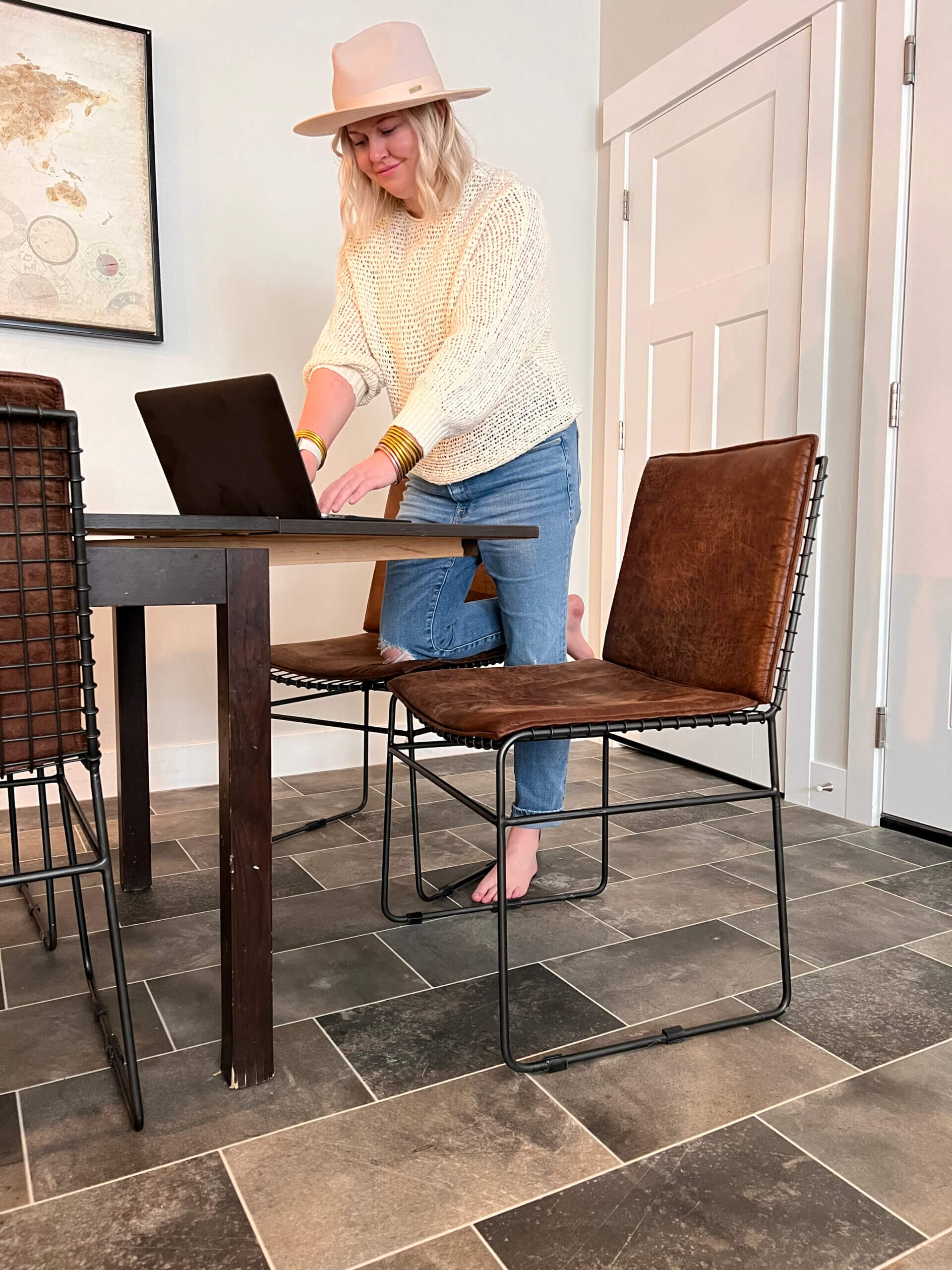
Do you struggle with low self-confidence? If so, you’re not alone. Fortunately, there are certain habits you can build to boost your self-confidence and start feeling better about yourself. From recognizing your strengths to expressing gratitude, these 7 powerful habits to build confidence can make a big difference. Read on to learn how to transform your life and feel more empowered.

IDENTIFYING YOUR SELF-LIMITING BELIEFS
One of the first steps in building self-confidence is identifying your self-limiting beliefs. These hold you back and prevent you from achieving your full potential. Some common examples of self-limiting beliefs include “I’m not good enough,” “I’ll never succeed,” or “I’m too old to start something new.”
To break free from these self-limiting beliefs, recognize them for what they are – simply thoughts holding you back. Then, challenge them with confident synonyms. For example, “I am more than capable of achieving my goals,” “I am a successful person,” or “It’s never too late to chase my dreams.”
By shifting your mindset from self-doubt to self-confidence, you’ll see yourself positively and approach challenges with a can-do attitude. Don’t let negative self-talk hold you back from achieving your full potential – take control of your thoughts and choose confident, empowering beliefs instead.
PRACTICING GRATITUDE
The most powerful way to boost your self-confidence is to practice gratitude regularly. By taking the time to acknowledge the good things in your life, you can shift your focus from what you lack to what you have. This can help you feel more confident and content in your present situation.
Practicing gratitude can also help you build a more positive outlook on life. When you appreciate the small things, you notice more good things around you. This can help you develop a confident synonym mindset and lead to more success in your personal and professional life.
To make gratitude a daily habit, start by setting aside a few minutes each day to reflect on what you’re grateful for. This could be anything from your health to your relationships to the beautiful sunset you saw on your walk home. Write these things down in a journal or say them out loud.
Another way to practice gratitude is to express your appreciation to others. Take the time to thank someone who has helped you or positively impacted your life. Not only will this make them feel good, but it will also strengthen your confidence by acknowledging the support you have around you.
By making gratitude a regular part of your life, you can cultivate a confident synonym mindset and feel more content and fulfilled. Give it a try and see how it can impact your life.
SETTING REALISTIC GOALS
Another powerful habit for building confidence is setting realistic goals. We become more motivated and focused when we know what we want to achieve. However, make sure that the goals we set are achievable and realistic. If we set unattainable goals, we will likely feel disappointed and discouraged, which can harm our self-confidence.
To set realistic goals, start by identifying what you want to achieve. Writing down your goals and making sure it’s specific and measurable. For example, instead of setting a goal to “be more successful,” set a goal to “increase my sales by 10% this quarter.”
Once you’ve set your goal, break it down into smaller, more manageable steps. This will help you stay motivated and make progress toward your goal. For example, if your goal is to increase your sales by 10%, break it down into steps like “reach out to 10 new potential clients each week” or “create a new marketing campaign.”
Finally, celebrate your progress along the way. Every time you achieve one of your smaller goals, take a moment to acknowledge your accomplishment and give yourself a pat on the back. This will help you stay motivated and build confidence as you work towards your larger goal.
Setting realistic goals is a powerful habit that can help you build confidence in all areas of your life. So, take some time to identify your goals, break them down into achievable steps, and watch your self-confidence grow as you progress toward achieving them.
TAKING SMALL RISKS
Building self-confidence is no easy task, but it can be achieved through developing and adopting certain habits. One is taking small risks. Often, when we are unsure of ourselves, we tend to avoid taking any risks at all. By avoiding risks, we limit ourselves and hinder our growth.
Taking small risks can help build our self-confidence, making us more willing to take risks later. These risks do not have to be monumental; Starting with small, manageable risks is more beneficial. For example, if you fear public speaking, start by speaking in front of a few people and gradually increase the number of people.
Taking small risks can also help us break out of our comfort zones. Often, we remain in our comfort zones because they provide a sense of security. However, stepping out of our comfort zones and taking risks can lead to new experiences and opportunities. By taking risks, we can challenge ourselves and embrace new situations confidently.
When we take risks and succeed, we develop a sense of accomplishment. This sense of accomplishment can further boost our self-confidence and make us more willing to take on new challenges.
To summarize, taking small risks is an important habit to develop to build self-confidence. Start small and gradually work your way up to more daring risks. Taking risks can help us break out of our comfort zones, provide new experiences and opportunities, and create a sense of accomplishment. As we take small risks and succeed, we build self-confidence and grow.
EMBRACING FAILURE
No one is immune to failure, and experiencing setbacks and obstacles is a part of life. However, what sets successful and confident people apart, is their ability to embrace failure and use it as a learning opportunity. Rather than letting failures defeat them, they use them as fuel to keep pushing forward.
When we fail, it can be easy to fall into a negative mindset and begin doubting ourselves. It’s important to see failure as a necessary step to success. We can learn valuable lessons from our mistakes, and by embracing them, we can develop a growth mindset that allows us to improve and grow.
One effective way to embrace failure is to practice self-compassion. This means treating ourselves with kindness and understanding rather than berating ourselves for our mistakes. When we approach our failures with self-compassion, we can acknowledge our mistakes without spiraling into negative self-talk. Instead, we can focus on learning from the experience and move forward.
Another important aspect of embracing failure is to avoid making it personal. When we fail, it can be easy to take it as a reflection of our worth. However, this thinking is unproductive and can lead to a lack of confidence and motivation. Instead, recognize that failure is a part of the process and doesn’t define who we are.
By embracing failure, we can build resilience, grit, and self-confidence. When we see that we can handle setbacks and challenges, we become more resilient and can cope with future obstacles. By reframing our perspective on failure, we can approach new challenges with a growth mindset and continue to learn and grow, building our confidence.
CULTIVATING POSITIVE SELF-TALK
The way we speak to ourselves can have a profound impact on our self-confidence. Negative self-talk can keep us trapped in self-doubt. On the other hand, positive self-talk can help us feel more confident, resilient, and empowered. Here are some tips for positive self-talk:
1. Notice your self-talk: Pay attention to how you talk to yourself throughout the day. Do you criticize yourself for small mistakes? Do you focus on your weaknesses rather than your strengths? Becoming aware of your negative self-talk is the first step in changing it.
2. Challenge your negative thoughts: When you catch yourself engaging in negative self-talk, challenge it with a more positive and realistic one. For example, if you think, “I’m never going to be good enough,” replace that thought with, “I am capable of achieving my goals with hard work and dedication.”
3. Use affirmations: Affirmations are short, positive statements that you repeat to yourself. They can help counteract negative self-talk and boost your self-confidence. Examples of affirmations include “I am confident and capable,” “I am worthy of love and respect,” and “I trust in my abilities.”
4. Practice self-compassion: Treat yourself with kindness, understanding, and empathy. Acknowledge your mistakes and flaws without judgment, and focus on your strengths and accomplishments.
By cultivating positive self-talk, you can build a strong foundation of self-confidence and resilience. It takes time and effort, but by practicing, you can learn to shift your inner dialogue and transform how you feel about yourself.

SURROUNDING YOURSELF WITH POSITIVE PEOPLE
As social beings, we are greatly influenced by the people we surround ourselves with. If we spend most of our time with negative, critical, or unsupportive people, it can have a damaging effect on our self-confidence and self-esteem.
On the other hand, if we surround ourselves with positive, uplifting, and supportive individuals, we are more likely to feel good about ourselves and our abilities. Here are some ways to surround yourself with positive people:
1. Choose Your Friends Wisely: Be mindful of who you spend your time with. Try to seek out friends who are positive, supportive, and uplifting. Avoid those who constantly put you down, criticize you, or make you feel bad about yourself.
2. Join Supportive Groups: Consider joining a group or community where you can connect with people who share your interests, values, or goals. This can be a great way to find supportive, like-minded individuals who can motivate and inspire you.
3. Attend Positive Events: Look for events or activities promoting positivity, personal growth, and self-confidence. Attend conferences, workshops, or classes focused on self-improvement and meet other individuals striving to build their confidence.
4. Surround Yourself with Role Models: Identify individuals you admire and respect for their self-confidence and achievements. Surrounding yourself with positive role models can be a great source of inspiration and motivation.
5. Minimize Exposure to Negative People: Sometimes, it’s hard to avoid negative people, but you can limit your exposure to them. When possible, try to distance yourself from people who are negative, critical, or unsupportive.
Remember that building confidence is a process that requires time and effort. Surrounding yourself with positive people can be a powerful tool to boost your self-confidence, but it’s just one piece of the puzzle.

. . .
Ready to take your self-confidence to the next level? Start incorporating these powerful habits into your daily routine today. For more tips and tricks on boosting self-esteem, check out how I cultivate a positive mindset. And don’t forget to share your progress and successes with me on social media using the hashtag #AdaptiveConfidence. You got this!


